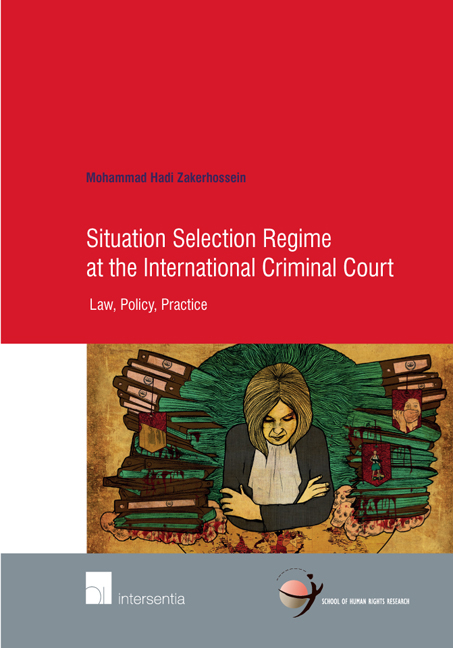Book contents
- Frontmatter
- Contents
- Acknowledgment
- Abbreviations
- General Introduction
- Part One Formulating the Concept of Situation in the Rome Statute Sense
- Part two Situation Selection Process
- Part three Situation Selection Criteria
- Chapter I Jurisdiction
- Chapter II Admissibility
- Chapter III Interests of Justice
- Part Four Situation Selection In Light Of Expressivism
- Conclusion
- Bibliography
- ICC Case Tables
- OTP Documents
- About the Author
- School of Human Rights Research Series
Chapter I - Jurisdiction
from Part three - Situation Selection Criteria
Published online by Cambridge University Press: 13 October 2018
- Frontmatter
- Contents
- Acknowledgment
- Abbreviations
- General Introduction
- Part One Formulating the Concept of Situation in the Rome Statute Sense
- Part two Situation Selection Process
- Part three Situation Selection Criteria
- Chapter I Jurisdiction
- Chapter II Admissibility
- Chapter III Interests of Justice
- Part Four Situation Selection In Light Of Expressivism
- Conclusion
- Bibliography
- ICC Case Tables
- OTP Documents
- About the Author
- School of Human Rights Research Series
Summary
The first condition to initiate an investigation into a situation is to have jurisdiction. Articles 15(1) and 53(1) of the Rome Statute refer to the jurisdiction requirement. These articles entail that in order to select a situation for investigation the Prosecutor has to come to the reasonable belief that, at least, one crime within the ICC's jurisdiction has been committed. The law of jurisdiction is one of the most controversial fields in international law. The term ‘jurisdiction’ has been defined by the ICC Appeals Chamber as denoting “the competence to deal with a criminal cause or matter under the Statute.” Jurisdiction is the domain of an entity's powers and authorities. As an international organization, there is no power for the ICC, unless such authority is explicitly or implicitly assigned to this institution. The Court's jurisdiction refers to those powers that have been defined for the Court. Every jurisdiction is based on an ultimate rule of recognition. The mandate of jurisdiction is to recognize the powers of an institution. The jurisdiction notion has both empowering and restrictive aspects. From one side, jurisdiction denotes the extent of the Court's power and the scope of its competence to intervene. From the other, it highlights the domain that remains outside of the Court's power. It is indeed the negative aspect of the functional necessity principle that states beyond the necessary functions, there is no power at an organization's disposal.
THE COURT's JURISDICTION BASIS
The ICC as a judicial institution has jurisdiction over the most serious international crimes. However, the possession of jurisdiction needs a legal basis. Even with the premise that there is no right to commit grave crimes, there is still a need for an additional justification for outsiders to punish the perpetrators of serious crimes. The seriousness of ICC crimes alone is not sufficient to justify and legitimize the Court's intervention. The Court's jurisdiction originates from the ‘delegated jurisdiction theory’. International relations are still working based on the States’ consent and will. Sovereign States can empower an organization. Jurisdiction and State sovereignty are intertwined. The authority of States to exercise their jurisdictions rests on their sovereignty. Indeed, exercising jurisdiction is equivalent to exercising sovereignty. The ICC as an international organization lacks any sovereignty.
- Type
- Chapter
- Information
- Situation Selection Regime at the International Criminal CourtLaw, Policy, Practice, pp. 165 - 200Publisher: IntersentiaPrint publication year: 2017

